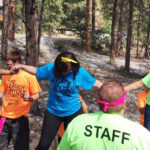ARLINGTON—As youth ministers and leaders from across Texas gathered at Youth Ministry Conclave on Oct. 11-13, they were greeted with a challenge to stop adding additional ministry or spiritual disciplines in an attempt to avoid spiritual emptiness and first learn to be refreshed by walking with Jesus.

Kari Jobe, worship leader at Gateway Church in Southlake, lead the more than 850 youth minsters and volunteers in worship during each of the five general sessions held during Conclave.
|
Speaker Doug Fields, founder of Simply Youth Ministry, said he realized many youth ministers and volunteers arrived at the conference on the verge of emptiness due to the demands of ministry and the local church.
“As a youth worker myself, I know what you need—some rest and refreshment,” Fields said. “You need a personal awakening to the majesty of Jesus to be more fully intimate with him.”
Fields knows when he is nearing emptiness in his own life, he said, noting he becomes shallow, confused, anxious, cynical, insecure, lacking compassion for the hurting and having difficulty in making good decisions. Often when leaders are at this point, they first turn to a checklist filled with Bible study, fasting, prayer and doing more ministry activities. This births obligation and brings one closer to emptiness, he said.
“When Jesus was calling people to him, it was very invitational,” Fields said. “He used words like ‘come to me,’ ‘be with me,’ ‘follow me.’ What I think we have done as youth ministers and are now casting to teenagers under us is we have taken this invitational tone and are now adding a task. … Spiritual fullness is not an invitation to do more. It is an invitation to experience the love of Jesus.”

Randy Frazee, senior minister at Oak Hills church in San Antonio, encouraged those attending Conclave with the story of Gideon during the Tuesday afternoon general session.
|

Doug Fields, founder of Simply Youth Ministry in Lake Forest, Cali., encouraged the youth ministers and ministry volunteers as he spoke during two general sessions at Conclave.
|
To avoid falling into the emptiness of obligation, Fields challenged participants to see a spiritual filling of Jesus as an continuous gleaning of the healing and refreshment Christ brings, instead of just a morning encounter before the day starts.
Sign up for our weekly edition and get all our headlines in your inbox on Thursdays
“I think there are a lot of people here today doing ministry with some failure and guilt because you have been racing for that one big idea or solution for your ministry, and you have missed the still, small voice of Jesus saying, ‘Come be with me,’” Fields said.
If youth ministry leaders began gleaning refreshment solely from their relationship with Christ, Fields believes, Christ would be more evident in their lives. Their teaching would be richer. Their conversations would come alive. Guilt and failure would be distant. And a sense of obligation and business in ministry would be replaced with peace.
“The Spirit of God would be sensed in your life, and emptiness would not be present,” he said. “This conference is an invitation to pursue the small and to pursue Jesus as he flows through.”
Refreshment will also come when ministers learn to place boundaries on their work and first minister to their families, Fields said.

Youth Ministry Conclave participants join in worship at the Arlington event.
|
“You may need to meet with some people and redefine the expectation placed on you,” he said. “The church is a place that values saying yes to everything. And many of us in ministry are people pleasers. We say yes to more, yes to activity. What is really tough is saying no to the many, many good things that come our way. Every time I say yes to something over here, I’m saying no to my family over there.”
Ministry never will stop, Fields said, as there always is another student to meet with, another Bible study to plan, another teacher to train. But ministers must realize that if their family isn’t strong, their ministry won’t be strong.
“If you are giving more time and energy to your ministry than your family, I want to encourage you to stop before it tears it apart,” Fields said. “There are other people who can shepherd the flock, who can teach and lead at your church. But in my family, there is no one else who can lead my family, who can speak into the lives of my kids as I can."
Though ministry can be difficult and at times ministers feel the church and others are against them, Randy Frazee, senior minister at Oak Hills Church in San Antonio and another Conclave speaker, said they must remember they serve a mighty God who can do anything.
“Whenever God wants to do something big, he always stacks the odds against his team,” Frazee said. “He does this so when there is victory, others will say there is no way. Some of you feel in a place where the enemy is saying no way, but know that we can say Yahweh. Some have given up on the youth of our day and say no way, but we say Yahweh. Some people have given up on the church saying it isn’t relevant today. They say no way, and we say Yahweh.”

Through the exhibit hall, in more than 40 breakout sessions and regional connecting times, those attending Conclave had ample opportunities to exchange ideas, encourage each other and be refreshed in their spiritual walk during the three-day event.
|
But in order for God to shine through, brokenness in the individual lives of youth ministers and leaders must first take place, Frazee said, as he referenced God using only Gideon, 300 soldiers, clay pots and torches to beat the incredibly strong and large Midianite army.
“On the basis of the word of God I say Yahweh, but in order for the light to shine out of the jar, it must first be broken,” Frazee said. “We know that God’s light and glory shines the brightest from us who have been broken the most. We do our best work as a bunch of cracked pots.”
Wes Hamilton, pastor at Hulen Street Baptist Church in Fort Worth, also talked about how youth ministers, leaders and students will not be able to live the life that Christ intended for them until they stop doing and first realize their identity in Christ.
“He didn’t come in order to make us better, to alter our behavior,” Hamilton said. “He didn’t die in order to change our external experience. He came to change the very core of who we are, to radically alter our identity.”
For identities to change, Hamilton said Christ followers must realize the transformation comes only through Christ and not through additional instruction or works.
“Our people, our students don’t need to be told what to do,” he said. “They need to be told who they are. They know what to do. I believe that. They go from conference to conference, from camp to D-now. We don’t need to be reminded of what to change but to be reminded that we are changed. We will not live as we are intended until we know who we are because identity forms behavior.”














We seek to connect God’s story and God’s people around the world. To learn more about God’s story, click here.
Send comments and feedback to Eric Black, our editor. For comments to be published, please specify “letter to the editor.” Maximum length for publication is 300 words.